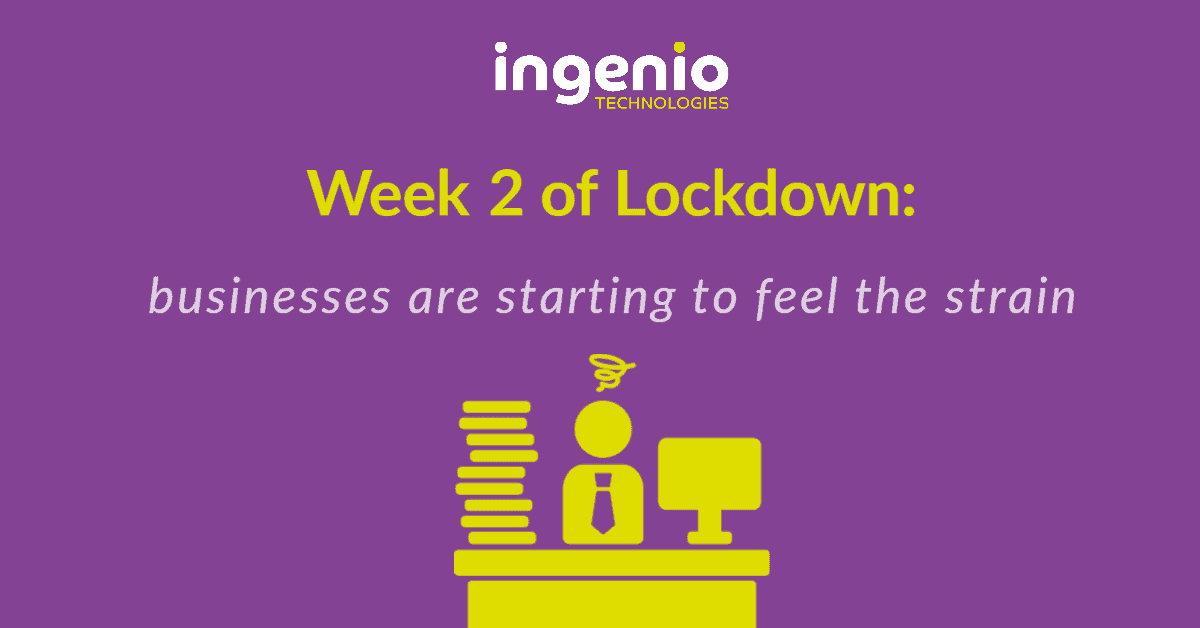.wp-post-image{display:none;}
[img src=”/wp-content/uploads/2020/04/Week-2-of-Lockdown-blog-image.png”]
The latest news of the Coronavirus is that we could be stuck in isolation for at least until the end of May, possibly even up to 6 months. We best start getting used to working from home and seeing it as the new ‘normal’.
The government have ordered so many non-essential businesses to close. This is taking a monumental toll on businesses and the way our economy functions.
Government to support small businesses
The Government have set rules for banks to provide loans supporting good businesses in financial difficulty. These loans are available to those who need access to cash to pay the following: rent, salaries of employees, purchase stock or pay suppliers. These will be government-backed loans on reasonable terms.
This should be good news, right?
We’d hope so but most bank branches are closed.
What about contacting a bank via phone?
Thousands of desperate business owners have struggled to get through by phone or, when they are successful have been told they are not eligible for the loan.
Banks taking advantage of the situation
Some lenders are demanding interest rates of up to 30%, which could be seen as taking advantage of the pandemic. Other high street banks were known to be charging around a 7% interest rate, although it could be as long as a month before businesses receive the loan. Businesses need access to cash to be able to survive the lockdown. Therefore, a large number of businesses could be forced to close if the lockdown lasts longer than a month.
How will this affect the UK economy?
Small and medium-sized businesses employ most of the workforce in the UK, around 23 million people. If we lose them it will be catastrophic for the UK economy.
Kirsty McGregor, the founder of Corporate Finance Network, has suggested that small businesses going bust need to be taken over by the government, so employees are still able to get paid.
Some businesses are lucky enough to have their employees continue working like normal from home, many of whom we have been supporting during this peculiar time.
What is the Coronavirus Job Retention Scheme (CJRS)?
The Government has introduced the CJRS to avoid the need for employers to make redundancies during the COVID-19 crisis.
This enables employers to retain their valuable employees for such a time when work picks back up and their skills are needed once again. It is applied by placing employees on ‘Furlough Leave’, which you most likely have heard about already.
Furloughed employees will be paid, by their employer, 80% of their salary capped at a maximum of £2,500. This amount will be reimbursed to the Company by the Government.
Furloughed employees will be paid via payroll as usual and the payment will be subject to the usual deductions.
If you are furloughed, you will continue to be employed by your employer, however you must not do any revenue generating work. You can do personal development training and (non-fee earning) administrative duties. Your access to the businesses systems may be revoked during this time.
The CJRS is proving to be a popular choice by many businesses across the UK but how effective will it be? Only time will tell.
If you, like many other businesses, are trying your hardest to keep your business afloat during this time you will definitely come across some hurdles.
Are you worried about having to cut costs and potentially lay off staff?
We’ve created a 4-step checklist to help you maintain business throughout these unprecedented times. It asks you to consider the following:
- Data security
- Access to data
- Home office set up
- Communication, collaboration and management
Click here, fill in your details, receive the urgent checklist via email to make sure you’ve covered all your bases.


